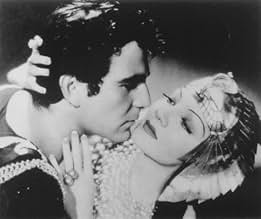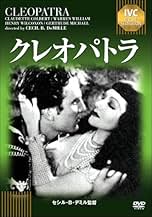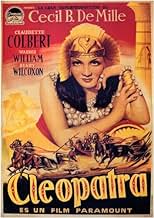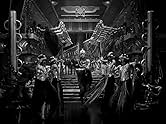NOTE IMDb
6,8/10
5 k
MA NOTE
Ajouter une intrigue dans votre langueThe man-hungry Queen of Egypt leads Julius Caesar and Marc Antony astray, amid scenes of DeMillean splendor.The man-hungry Queen of Egypt leads Julius Caesar and Marc Antony astray, amid scenes of DeMillean splendor.The man-hungry Queen of Egypt leads Julius Caesar and Marc Antony astray, amid scenes of DeMillean splendor.
- Réalisation
- Scénario
- Casting principal
- Récompensé par 1 Oscar
- 2 victoires et 4 nominations au total
Ian Maclaren
- Cassius
- (as Ian MacLaren)
Ferdinand Gottschalk
- Glabrio
- (scènes coupées)
Jayne Regan
- Lady Vesta
- (as Jane Regan)
Avis à la une
I have been very fond of this movie for years, particularly as compared with Fox's bloated monstrosity of 1963. Colbert is admittedly somewhat miscast (her face is altogether Parisienne), but she handles the part with considerable charm. Warren William, usually a very limited actor, is as good a Caesar as I have seen on film, commanding and uncomfortable by turns; while Henry Wilcoxon is the definitive Mark Antony, laughing, brawling, swaggering, crude and brooding. C. Aubrey Smith as Enobarbus, the last of the hardcore Roman republicans, is perfect. Victor Milner's cinematography is superb, if old-fashioned. There is one magnificent pullback shot aboard Cleopatra's barge, with more and more stuff entering the frame, which as pure cinema is worth more than all four hours of the Liz Taylor version for my money. Shakespeare and Shaw have both been drawn upon here and there, and the movie has generally good (and fun) dialogue, not always one of DeMille's strengths. Consider also the scene of Cleopatra's entrance into Rome: contrary to DeMille's usual reputation, this scene is underplayed, depicting a plausible parade through a very real Roman street with authentic trappings, compared to the outrageously bogus and overblown spectacle given us in 1963. A word is also in order for the music of Rudolph Kopp, an extremely obscure Hollywood composer, who turns in an atmospheric score redolant of the old silent movies. This style is easy to make fun of, but see how effective it is in the highly theatrical opening credits! DeMille used silent film technique well into the talkie era, particularly in crowd scenes, and it still works. The battle scenes are the weakest point, since evidently Paramount ran out of cash and C.B. had to make do with a bunch of short shots put together with Russian cutting; nevertheless, this is still as good a picture on the subject as has yet been made, a bit of extravagant old Hollywood at its most polished.
Was Demille more daring than any other director or was he just clueless? What does one say when the curtains close on Antony and Cleopatra and suddenly the screen erupts with more sexual symbols than any moment in Hollywood's history? From the phallic symbols (oars) to the yonic symbols (curtains) until finally both orgasmically mesh together in a final combination (a drummer with his drum), the scene tells us we're viewing the artistry of a kinky genius or a shameless carney.
And along with the jawdropping visuals, the film is crammed with juicy Demille-like dialog. Unlike other Demille films, this one has a wonderful cast to deliver his unique oneliners, and there are so many. My own favorites are the moments of dumbdowned Shakespeare. Instead of speaking of Cleopatra's "infinite variety" we are told she is always "many colored" and, of course, instead of "Et tu, Brute?" we get, "You? You too, Brutus?" What can you say about a movie in which Julius Ceasar says "Nope" to his senators? Nothing. One can only savor every delicious moment of camp that only a Demille could serve up.
The Taylor/Burton version is more spectacular, more intelligent, and more historical, but for those who relish kitsch--and this story always lends itself to it--this version is the best.
And along with the jawdropping visuals, the film is crammed with juicy Demille-like dialog. Unlike other Demille films, this one has a wonderful cast to deliver his unique oneliners, and there are so many. My own favorites are the moments of dumbdowned Shakespeare. Instead of speaking of Cleopatra's "infinite variety" we are told she is always "many colored" and, of course, instead of "Et tu, Brute?" we get, "You? You too, Brutus?" What can you say about a movie in which Julius Ceasar says "Nope" to his senators? Nothing. One can only savor every delicious moment of camp that only a Demille could serve up.
The Taylor/Burton version is more spectacular, more intelligent, and more historical, but for those who relish kitsch--and this story always lends itself to it--this version is the best.
Spectacular DeMille hokum that, like most of his work, is hard to dislike despite its flaws. Say what you will about Cecil B. DeMille but he knew how to put on a show. The sets, costumes, and pageantry are excellent. The actors are all very enjoyable even if they ham it up some. Claudette Colbert is sexy and a treat to watch. Warren William's Julius Caesar seems like he would be more at home shooting craps or hustling pool than ruling Rome. Henry Wilcoxon is quite good as Marc Antony. The rest of the cast is solid, as DeMille supporting casts usually were. I have no sympathy for history buffs who gripe about this movie's failure to adhere to historical accuracy. If you watched a movie, especially a C.B. DeMille movie, looking for a history lesson then the fault is on you and not him. It's a fun piece of escapism loosely based on real people and events. Lighten up and enjoy the movie.
One never thinks of Claudette Colbert as a sex symbol but she puts that to rest with her great interpretation of Cleopatra. What a siren she is as she vamps her way through this film. Henry Wilcoxon, truly an overlooked actor, is a perfect Antony. I have often wondered why he never made a bigger splash. I'm not as taken with Warren William as Caesar; he seems more at home in films with contemporary settings. The barge scene, with the ever increasing beat of the drums,implying what is happening or about to happen, is full of passion. More obvious scenes in modern movies leave nothing to the imagination....this leaves most of it to the imagination and is, therefore, much more effective. A highly recommended film.
This movie is a typical DeMille PRODUCTION, with all the strengths-gorgeous sets, costumes and a sort of grandeur to all the proceedings-as well as the weaknesses-the lavishness often comes at the expense of things like the story, acting and plot. There's no question that it's beautiful (although, interestingly enough, none of it's five nominations for Academy Awards was for Interior Decoration.) Claudette Colbert does a wnderful job, but most of the other peformances are only average at best. 1934 was a particularly good year for Colbert, who won an Academy Award for It Happened One Night and starred in at least two other major productions that year-Imitation of Life and this movie. The picture feels a bit dated, but, while far from perfect, I think it superior to the 1963 remake in a great many respects and it's well worth watching.
Le saviez-vous
- AnecdotesWhen Cecil B. DeMille was in pre-production on this film, he asked to screen the original La Reine des Césars (1917) with Theda Bara. No prints could be found in Los Angeles, so a copy was borrowed from the Fox office in New York. After DeMille viewed the film, it was sent back to Little Ferry, NJ. On 7/9/37 a fire at the storage facility destroyed almost all of Fox's known archived prints, most likely including "Cleopatra". The screening for DeMille's company, on 2/15/34, may have been the last time anyone saw the legendary film. However, on September 14, 2023, 42 seconds of extremely rare footage of the final act in which Cleopatra prepares to die as the Roman Legion marches upon her palace was procured from a 1920's toy film projector and presented on YouTube.
- GaffesThe main doors to Cleopatra's chambers have modern metal hinges.
- Citations
Cleopatra: Together we could conquer the world.
Julius Caesar: Nice of you to include me.
- Versions alternativesThe movie was released in Germany with German direction by Kurt Bleines and German dialogue by Helmut Brandis and Helena von Fortenbach.
- ConnexionsEdited into Spisok korabley (2008)
Meilleurs choix
Connectez-vous pour évaluer et suivre la liste de favoris afin de recevoir des recommandations personnalisées
Détails
- Durée
- 1h 40min(100 min)
- Couleur
- Rapport de forme
- 1.37 : 1
Contribuer à cette page
Suggérer une modification ou ajouter du contenu manquant







































